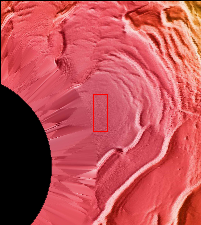
Context imageThis false color image shows pits on the south polar cap. The terrain has the appearance of a slice of swiss cheese, giving rise to the informal name. This is thought that these depressions form by sublimation. Sublimation is the process where the solid changes directly into a gas phase - ie. no fluid form in between the solid and gaseous forms. Sublimation occurs due to the arrival of the sun in the spring and summer seasons at the pole. These pits have been shown to grow in size over a short time period, with the surface changing over the course of years rather than thousands of years.
The THEMIS VIS camera contains 5 filters. The data from different filters can be combined in multiple ways to create a false color image. These false color images may reveal subtle variations of the surface not easily identified in a single band image.
Orbit Number: 65383 Latitude: -86.7696 Longitude: 354.379 Instrument: VIS Captured: 2016-09-09 11:18
Please see the THEMIS Data Citation Note for details on crediting THEMIS images.
NASA's Jet Propulsion Laboratory manages the 2001 Mars Odyssey mission for NASA's Science Mission Directorate, Washington, D.C. The Thermal Emission Imaging System (THEMIS) was developed by Arizona State University, Tempe, in collaboration with Raytheon Santa Barbara Remote Sensing. The THEMIS investigation is led by Dr. Philip Christensen at Arizona State University. Lockheed Martin Astronautics, Denver, is the prime contractor for the Odyssey project, and developed and built the orbiter. Mission operations are conducted jointly from Lockheed Martin and from JPL, a division of the California Institute of Technology in Pasadena.

